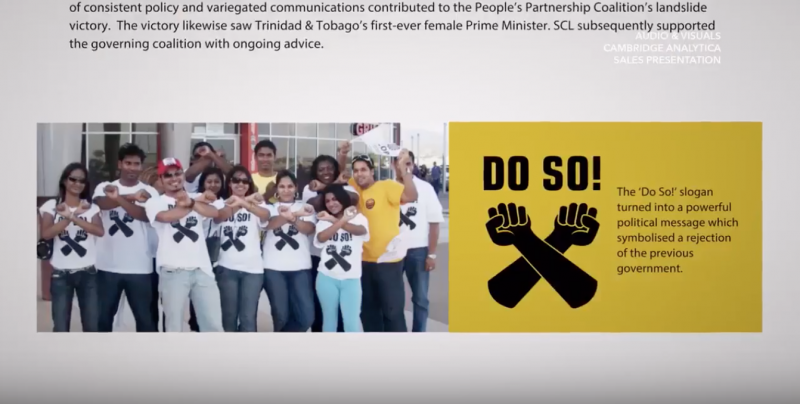Complexion
ʇdᴉɹɔsǝɥʇdᴉlɟ
The internet makes this way easier than before because divide and conquer has been taken to the megapixel level and people think they're seeing the whole picture but aren't even close to a thumbnail...
Netflix's ‘The Great Hack’ highlights Cambridge Analytica's role in Trinidad & Tobago elections
The political party that allegedly hired the company denies it
Written by Jada Steuart | Posted 5 August 2019 23:32 GMT

Screenshot taken from YouTube video, showing an excerpt from “The Great Hack,” a documentary related to Cambridge Analytica's alleged work during Trinidad and Tobago's 2010 general elections.
Netflix's new documentary “The Great Hack” — which takes a deep dive into how Cambridge Analytica and its former parent company, the SCL Group, were able to manipulate elections all over the world — has renewed an online discussion about corruption and voter manipulation in Trinidad and Tobago.
Cambridge Analytica is best known for using the data of millions of people without their consent for strategic marketing purposes in political campaigns like Donald Trump's 2016 presidential bid and Brexit's Leave Campaign. But the company also helped influence voting behaviour in Global South countries, Trinidad and Tobago being the most notable example highlighted in the documentary.
In the film, Cambridge Analytica says it worked for “the Indians” — meaning they worked on behalf of the majority-Indian United National Congress (UNC) party — and, by extension, the group of smaller affiliate parties that teamed up to defeat the incumbent People's National Movement (PNM), which primarily attracts Afro-Trinbagonian voters.
The audio from a Cambridge Analytica sales presentation illustrates how the company sought to influence young, black voters through a campaign titled “Do So”. At the time, most citizens thought the campaign was simply inspired by the actions of Percy Villafana, an elderly pensioner who defiantly crossed his arms in denial of access to his property when the then-prime minister and PNM leader, Patrick Manning, was canvassing voters in Villafana's neighbourhood pre-elections. But revelations about how Cambridge Analytica operated have since cast the seemingly grass roots movement in a far more sinister light.
A Cambridge Analytica spokesperson in the film said the campaign attempted to “increase apathy” among young, black voters so that this demographic would interpret the refusal to vote as “a sign of resistance against […] politics” and not show up at the polls.
The UNC went on to win the 2010 election:
After the Facebook/Cambridge Analytica data scandal broke in 2018, the UNC has routinely denied knowledge of the company's existence and of having any relationship with them. UNC party leader, Kamla Persad-Bissessar, passed the buck, but the Congress of the People, one of several political parties that comprised the UNC-led coalition government back in 2010, later admitted that there had been “discussions and some engagement [with] SCL”.
Since the documentary's release on Netflix on July 24, 2019, both the general public and members of the government have responded, including Attorney General Faris Al-Rawi, who revealed that his office has been in discussions with attorneys for Cambridge Analytica whistleblower Christopher Wylie. The Trinidad and Tobago government wants Wylie to testify in front of a Joint Select Committee to shed light on the issue of micro-targeting in the country and provide evidence regarding which UNC members played a part in sanctioning the political strategy employed by Cambridge Analytica.
Many people who watched the documentary, both locally and internationally, expressed their shock that the company was able to manipulate the 2010 election by making people “not vote”:
Others seemed unfazed that Trinidad and Tobago's name got called:
Despite the massive amount of press that the Cambridge Analytica scandal received globally, the issue of how the company helped manipulate the electoral process in developing nations has been underreported, even though the majority of the company's elections-based clients are from the Global South.
The fact that many of these countries — including Trinidad and Tobago — do not have up to date cybersecurity laws has made it easier for companies like Cambridge Analytica to fly under the radar and work the system:
The hope is that if and when Wylie comes to Trinidad and Tobago, he will not only provide evidence of a relationship between some of the UNC's top officials and Cambridge Analytica, but also enlighten the country's policymakers on the effects of micro-targeting on the internet. Wylie's potential visit is still under discussion between his attorneys and the Office of the Attorney General.
Netflix’s ‘The Great Hack’ highlights Cambridge Analytica’s role in Trinidad & Tobago elections
I wouldn't say msm in this case
Cambridge Analytica targets people who are easily influenced by misinformation on the internet.

There is also a subtle anti homeowner movement going on as well. Got agents out here discouraging folks from buying land and property.That and the ADOS VS foreign Blacks
The swirler movement
The don’t vote rhetoric
Breh, we under constant attack and don’t even know it.